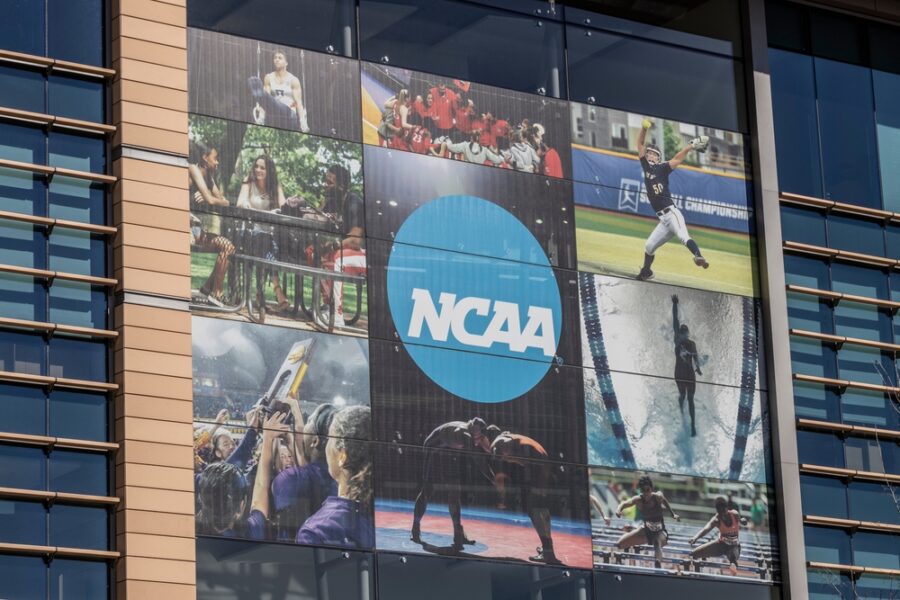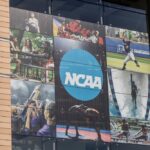College athletes to be allowed to bet on pro sports after landmark rule change

NCAA athletes and staff will be allowed to bet on professional sports following a rule change that will take effect on November 1.
On October 22, the Division II and Division III management councils revealed that they had approved the rule change, following the Division I Administrative Committee’s adoption of the change on October 8.
The rule applies only to professional sports like the NFL, MLB, NBA, NHL, and WNBA. The rule change will not apply to collegiate sports.
This ruling comes as the NCAA and federal authorities are investigating former athletes in connection with an alleged match-fixing scandal at smaller conference schools involving men’s basketball.
A press release from the Division II and Division III councils emphasized that the rule change was not an endorsement of gambling. Instead, the councils said that it focused on “the importance of schools using harm reduction strategies and resources provided by the Committee on Competitive Safeguards and Medical Aspects of Sports and the Sport Science Institute.”
Roberta Page, director of athletics at Slippery Rock and chair of the Division II Management Council, echoed similar sentiments, “Our action reflects alignment across divisions while maintaining the principles that guide college sports. This change recognizes the realities of today’s sports environment without compromising our commitment to protecting the integrity of college competition or the well-being of student-athletes.”
Verticals:
Sectors:
Topics:
Dig Deeper
The Backstory
Why the NCAA’s betting pivot matters now
The NCAA’s decision to let college athletes and staff wager on professional sports reflects a yearslong shift in U.S. gambling policy and the organization’s own changing risk calculus. What began as a tentative exploration this spring hardened into a formal rule change after Division I leaders endorsed the move and Divisions II and III followed this month. The change takes effect Nov. 1 and preserves a strict ban on betting on collegiate events.
The NCAA had telegraphed its direction in recent months. In late summer, the Division I Council voted to recommend that athletes and staff be allowed to bet on professional leagues while maintaining prohibitions on college sports wagering. The Council framed the existing blanket ban as a relic from a time before legal sports betting proliferated nationwide. As the Illinois athletics director and Council chair, Josh Whitman, put it, rules written when “sports gambling was largely illegal” no longer reflected campus realities. That recommendation, which still required additional approvals at the time, signaled the NCAA’s next steps and set the stage for this week’s final action. The earlier deliberations are outlined in the Division I Council recommendation.
By October, Division I’s Administrative Committee had already moved ahead, passing a proposal that would end the organization’s blanket ban on professional sports wagering for student-athletes and staff. The plan awaited Division II and Division III consideration at month’s end. That sequencing, described in the NCAA’s move toward allowing pro sports bets, framed the final approvals that arrived this week.
From prohibition to harm reduction
The NCAA has cast the rule change as pragmatic rather than permissive. Leaders argue that legal betting has become so widespread that a narrow, enforceable policy focused on the highest risks is more credible than an all-out ban that many athletes already ignore. Investigations into athlete wagering, including high-profile cases in men’s basketball, underscored the gap between policy and practice and raised integrity concerns that the NCAA says are better addressed with targeted guardrails and education.
That approach mirrors broader trends in regulated gambling, where enforcement against prohibited markets is paired with education, monitoring and data-sharing. It also reflects the NCAA’s recent emphasis on protecting athletes from harassment tied to betting markets. In May, the organization extended its data deal with Genius Sports with a new condition: no sportsbook markets on negative player props for college athletes. The move was designed to blunt a surge of online abuse directed at players. The NCAA detailed those changes in its announcement on limiting negative college prop bets, citing harassment patterns around marquee events.
By narrowing what athletes can bet on while pushing to reduce harmful market types, the NCAA is trying to separate professional wagering — which it sees as manageable on the integrity front — from betting that directly pressures student-athletes in their own competition ecosystem.
Guardrails around college markets tighten
Even as the NCAA loosens its stance on pro sports bets, it has pressed for tighter reins on college prop markets at the state level. Lawmakers have responded. In New Jersey, a bill to prohibit player-specific props in college sports cleared a Senate committee in June with bipartisan support. Sponsors framed the ban as a way to curb harassment and protect the game’s integrity, echoing the NCAA’s arguments. The proposal’s progress is detailed in coverage of the New Jersey college prop bet ban.
More than half of states with legal betting restrict some college props, and the NCAA is urging holdouts to follow. The association’s data-sharing agreement with Genius Sports extends its monitoring capabilities across conferences and events, which officials say helps spot irregularities and react faster to threats. As more states adopt prop limits, the NCAA’s patchwork policy landscape begins to align with its national stance.
This regulatory tightening around college markets provides a crucial backdrop for letting athletes bet on professional leagues. The NCAA is betting that insulating athletes from direct wagering pressure in their own competitions reduces integrity risks, even as it acknowledges the reality that many already participate in legal betting as consumers.
Industry friction over market boundaries
The rule change arrives amid a broader clash over where sports betting ends and other forms of event wagering begin. That fight is playing out in Nevada, where prediction market operator Kalshi is suing state regulators after they ordered the company to stop offering certain contracts. Regulators argue Kalshi’s event contracts amount to sports betting that should abide by Nevada’s gaming laws, including age limits and bet-type restrictions. The industry stakes rose when a judge allowed the Nevada Resort Association to join the case to protect casino interests if Kalshi prevails. The development is covered in the Nevada Resort Association’s intervention.
While the Kalshi dispute sits outside collegiate governance, it underscores how quickly lines are blurring among sports wagering, prediction markets and financial-style contracts. For the NCAA, the takeaway is that rule clarity and enforcement partnerships matter more than ever, because market participants will test boundaries as legal frameworks evolve. Any gap can become an integrity risk when student-athletes are involved, directly or indirectly.
The road from recommendation to implementation
The NCAA’s path to this week’s decision ran through several gatekeepers and a public messaging campaign aimed at framing the change as risk management. The Division I Board of Directors had already signaled support in April during a videoconference, according to the Council’s subsequent recommendation. In October, Division I’s Administrative Committee endorsed the pro-bet carveout and sent it to Divisions II and III for review, as outlined in the October move toward the change. That sequencing culminated in this week’s approval across divisions.
Next comes execution. Schools will update compliance materials, education modules and team rules to draw bright lines: no betting on college sports under any circumstances, no use of insider information for wagers at any level, and strict adherence to state laws and campus policies. Expect athletic departments to emphasize reporting mechanisms for suspected violations and to expand programming on responsible gambling, social media risks and mental health support. The NCAA has aligned its messaging with harm reduction, pointing members to resources from the Committee on Competitive Safeguards and the Sport Science Institute.
What’s at stake for athletes, schools and sportsbooks
For athletes, the new policy reduces the risk of career-altering penalties for behavior that mirrors that of their peers off the field, provided they steer clear of college markets. For schools, it shifts the compliance burden from policing all betting to educating on specific red lines and monitoring for integrity issues. For sportsbooks, it could nudge product and marketing strategies, with more emphasis on professional leagues and continued retrenchment on college prop offerings as states tighten rules.
The NCAA’s move is not a green light for wider betting. It is an attempt to calibrate policy to a legal environment that has outpaced legacy rules, while doubling down on protections where the organization sees the greatest danger. The follow-through — in classrooms, locker rooms and statehouses — will determine whether the recalibration holds.






